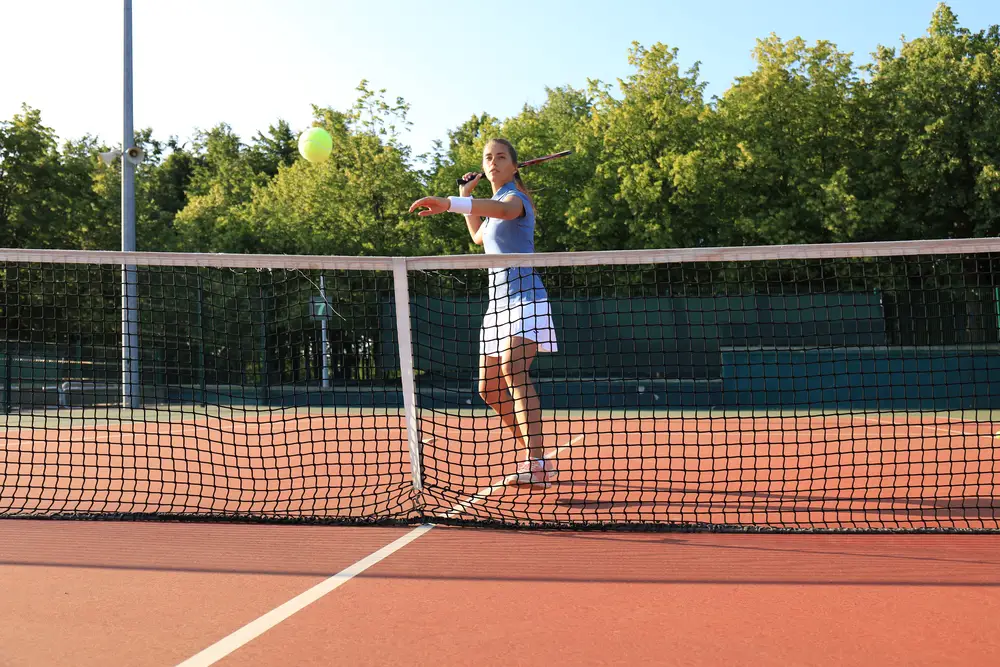When it’s a grass-court season, we see players attempting drop shots more. Sometimes these drop shots are very close to the net.
With the speed players must run to get there, it could be easier to keep running and jump over the net. So why don’t players jump over the net more?
You are not allowed to jump over the net. The International Tennis Federation (ITF) explicitly states that a player will lose the point if they jump over the net in the middle of a point. There are a couple of exceptions if the arm reaches over the net.
Some videos of ATP/WTA players jumping over the net in the middle of a point. In all these instances, the player would have lost the point.
In this article I will be covering:
- Whether you can go to your opponent’s side of the court
- If your racket can go over the net
- The consequences of touching the net during a point
If you would like to learn the exceptions for when you can reach over the net, read on!
Can You Enter The Opponent’s Side Of The Court?

If the ball is still in play, you cannot step onto the opponent’s court under any circumstances.
The court is considered anywhere that is in. So, in doubles, it would be up to the outer tramlines. In singles, the inner tramlines.
This means that if you run around the net after hitting the ball, it is a legal shot. The only reason it would not be allowed in if you stepped onto the court itself.
When the point has finished, nothing is banning you from crossing over the net.
As a teenager, I was always taught that not crossing the net when playing on clay is good etiquette.
This is because you would be crossing the net after the point has finished checking the mark of a ball you’ve hit. It thus seems you are doubting your opponent’s line call.
On a hard or grass court, there is no mark to check. Therefore it is not as controversial to cross over.
Other than not needing to stop running, I can’t think of a scenario in which a player would need to or benefit from stepping onto the other court.
In theory, you could jump over the net and onto the opponent’s court if the ball has already bounced twice.
It would have to be a pretty unique point for this to naturally happen, though. However, this would be okay because the ITF only bans it in the middle of a point.
I found a video of a match between Roger Federer and Juan Martin Del Potro.
Federer plays a short drop shot in the video, and Del Potro is forced to run to the net. After running to the net, Del Potro hops over.
As the ball has bounced twice, the point has ended, and Del Potro has not broken any rules.
Can Your Racket Reach Over The Net In Tennis?

Players are not allowed to reach over the net with their rackets. There are, however, two exceptions to this rule.
The first exception is if you contact the ball on your side of the net. For example, it is legal if you hit a volley near the net and your racket goes over.
As long as you contact the ball on your side of the net, you can swing through, and your racket will be allowed to cross the net.
The second allowance is if the ball is blown back over the net by wind or backspin.
If the ball bounces first on your side and blows back over the net, you are allowed to contact the ball to stop it from bouncing twice.
The reason this rule exists is that without it, your opponent would be guaranteed the point.
If I manage to hit a ball with so much slice that it bounces back over to my side, you have no chance at all without reaching over.
Even with the allowance to reach over the net, I would be impressed if you could win the point.
It would take so much time to even get there and reach over the net.
These rules may seem a little confusing, but you’re not alone.
At the 2014 Miami Master, Djokovic broke this rule. In the middle of a point, he contacted the ball on his opponent’s side of the net.
Fortunately for Djokovic, the umpire did not notice.
His opponent, Andy Murray, was quick to point out the mistake.
After the match, Djokovic said that he was not aware of the rule.
It is incredible to think that you can get to #1 in the world and still not know all the game rules.
What Happens If You Touch The Net In Tennis?

The ITF Rules of tennis make clear that you are not allowed to touch the net. This includes touching the net with the racket, clothing, or anything else the player is carrying.
It also states that the racket cannot touch the net, even if it is not in the player’s hand.
So, no throwing the racket at the net.
Unlike the regulations on reaching over the net, there are no exceptions to this rule.
If you touch the net in the middle of a rally, you will lose the point. Therefore, in the rules, it is not listed as a code violation.
Your opponent will just gain a point in the same way he would if you had hit the ball out.
The most likely way you will accidentally break this rule is if you are at the net volleying. If you take a ball very close to the net, the odds of you contacting the net by mistake are higher.
Another risk is a spare ball rolling into the net. Picture this scenario.
You are playing a doubles match; your partner has a hole in his pocket; in his pocket, he has a ball. The ball falls out of the pocket in the middle of the point and rolls into the net.
Even though this is not likely, it is something I have seen happen before.
Most people don’t even notice and play on. So the point should technically be awarded to the other team.
Also read: Why Do Tennis Players Apologize Hitting The Net?
Final Words
It’s not something that happens often, but you may one day find yourself sprinting towards the net too fast to stop in time.
When I was a coach in England, all the clubs I worked in encouraged players not to jump over the net when changing ends.
In Norway, they are not quite as concerned about health and safety.
Have you seen someone hop the net before? Maybe you have a funny story of a point you played when you had to jump the net. I once knew someone who could just step over the net.

